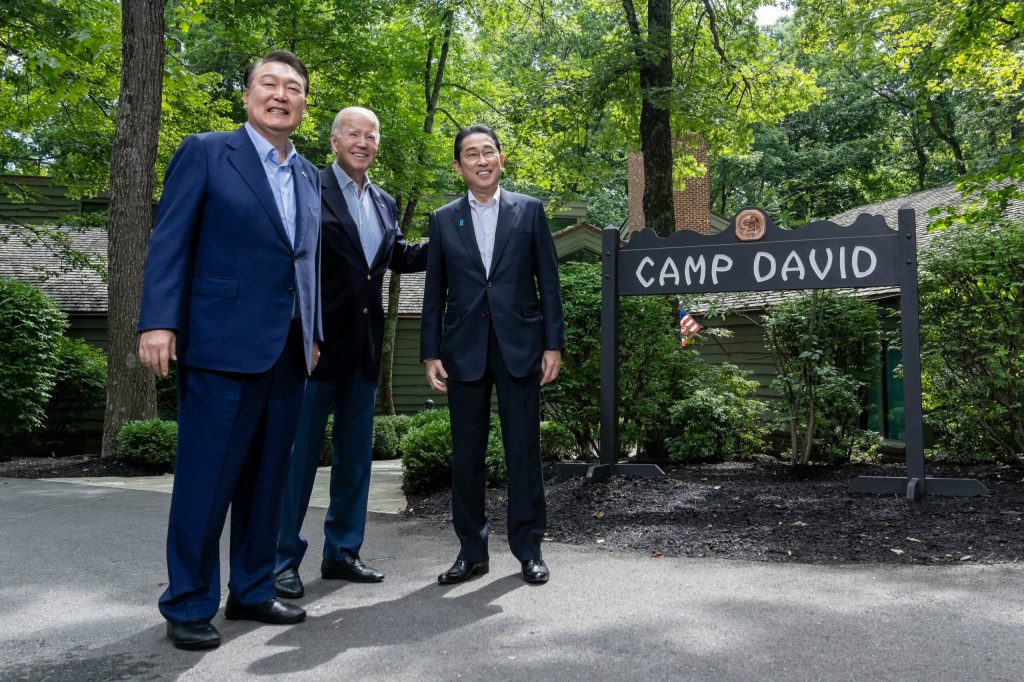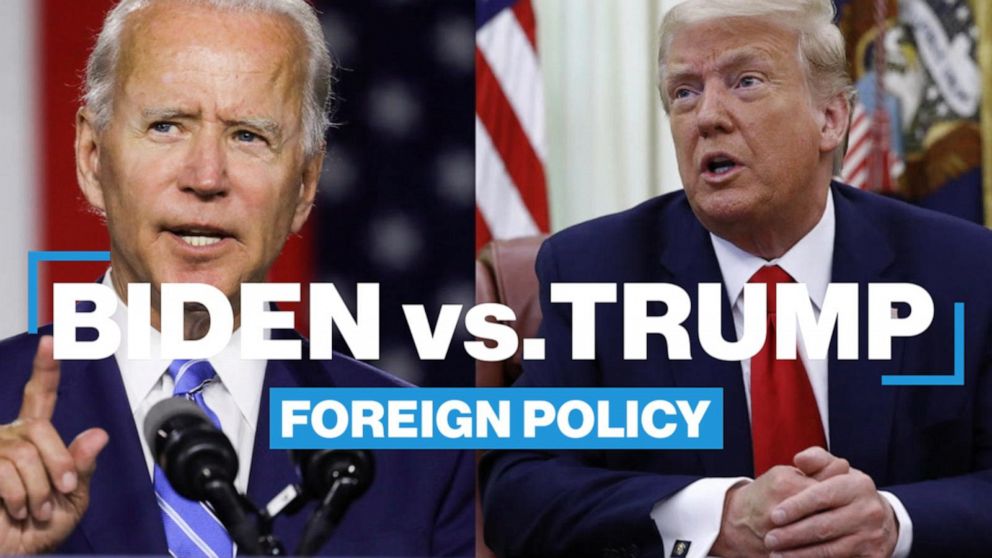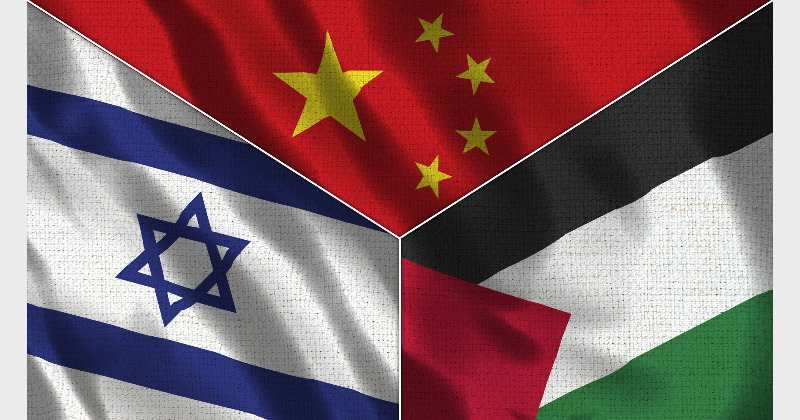Introduction
The August 2023 Camp David Summit marked a significant milestone in diplomatic relations between the United States, Japan, and South Korea. The Camp David Principles – founded on the pillars of shared norms, respect for international law, and common values — aim to foster a free and open Indo-Pacific. The principles also vehemently oppose any unilateral attempts to alter the status quo by force or coercion, particularly the Taiwan issue, and strive to contribute to the denuclearization of the Korean peninsula.
This trilateral partnership, however, raises important questions about the role of other interested parties in the region. In light of Canada’s declared interest in a proactive and contributory place in the Indo-Pacific as highlighted in the November 2022 release of Canada’s Indo-Pacific Strategy, there are questions as to whether Canada can plug into this minilateral and add value? Is there room for another member under the Camp David Principles? What is the correct balance of minilateral and bilateral engagement? This policy brief explores the strengths and weaknesses of this new minilateral and considers the potential opportunities for Canada to strengthen its Indo-Pacific engagement.
The Camp David Principles: A New Minilateral
The Camp David Principles represent a commitment to annual joint military exercises, regularized trilateral leaders’ diplomacy, and annual meetings between foreign ministers, defence ministers, commerce and industry ministers, and national security advisors.
The initiative is also designed to oppose any unilateral attempts to change the status quo in the Indo-Pacific region by force or coercion, particularly with regard to Taiwan. Centrally, it aims to contribute to the denuclearization of the Korean Peninsula, a shared priority in Seoul, Tokyo and Washington.
This minilateral cooperation holds the potential to significantly influence the geopolitical dynamics of the Indo-Pacific region. Crucially, more security synergy between the three minilateral participants means that more resources can be delivered in a coordinated manner to promote peace and stability in the Indo-Pacific, on the Korean Peninsula, and potentially across the Taiwan strait.
It also highlights the challenges of managing a diverse set of national interests within a complex regional context. South Korean and Japanese domestic politics, in particular, may hinder deeper cooperation but so will the upcoming US Presidential elections.
Canada’s Opportunity?
Despite the strong potential of the Camp David Principles, it is not clear that Canada’s participation would be efficient or welcomed. How could Canada effectively insert itself into this nascent minilateral? Where are the areas of synergy? What could Canada bring to the table? The answer to these questions is that the trilateral itself is at an experimental stage regarding where, why, how, and what it does, and including Canada at this stage may complicate the institutionalization of the minilateral.
As for being welcomed to the minilateral, Tokyo and Seoul, while satisfied with the current trajectory of bilateral relations both know that domestic politics in South Korea will determine the sustainability of both the bilateral relationship and the trilateral relationship within the context of the Camp David Principles.
Adding a fourth member to the new and still precarious Camp David Three
may be inculcating a complexity that does not warrant involvement. A more nuanced approach would be for Canada to strengthen its engagement in the Indo-Pacific through bilateral cooperation with each stakeholder. Such an approach would enable Canada to navigate the complexities of regional politics more effectively than attempting to join the existing trilateral partnership. Each bilateral relationship offers a unique opportunity for Canada to advance its interests in the region.
With the United States, Canada shares a long history of close cooperation and mutual understanding. Expanding this partnership to encompass Indo-Pacific issues could lead to significant benefits for both countries.
A deeper engagement with the United States in the context of the Indo-Pacific could involve regular high-level consultations on Indo-Pacific affairs, coordination of policies, and joint initiatives for capacity-building in the region.
The two countries could also work together on promoting rules-based order and good governance in the region, and on issues like climate change and cybersecurity where they have common interests.
A more nuanced approach would be for Canada to strengthen its engagement in the Indo-Pacific through bilateral cooperation with each stakeholder.
Such an approach would enable Canada to navigate the complexities of regional politics more effectively than attempting to join the existing trilateral partnership.
Operation NEON, an established platform of cooperation between Canada, other countries and the trilateral minilateral presents a compelling model for future engagement. This platform has proven to be an effective means of fostering military cooperation and understanding between the nations, contributing to the stability and security of the Indo-Pacific.
By continuing, if not expanding Operation NEON, Canada could cultivate a sustainable diplomatic footprint within the region. Not only would this bolster Canada’s defence relations in the region including with the trilateral, but it would also serve as a tangible demonstration of Canada’s commitment to peace and stability within the Indo-Pacific.
Another area of coordination should be trade. Canada should work with Japan to enlarge the Comprehensive and Progressive Trans-Pacific Partnership (CPTPP), with South Korea, Thailand, Taiwan and the Philippines as potential candidates.
The objective should be to expand the trading bloc so that its combined economies reach a critical mass and surpass that of China. This would serve not only to provide the gravity needed to shape the region’s economic development, but it would also enhance the strategic autonomy of all current and future CPTPP members by reducing their vulnerability to economic coercion.
Furthermore, enhancing cooperation with Japan could entail a closer alignment of policies towards the region, particularly in areas such as maritime security, infrastructure development, and connectivity initiatives.
The two countries could also collaborate on initiatives that promote inclusiveness and sustainability in the region, and engage in joint research and development in emerging technologies.
South Korea presents an opportunity for Canada to engage with a dynamic economy that is becoming increasingly influential on the global stage. The two countries already have a free trade agreement, which could serve as a foundation for broader strategic cooperation.
Canada could look to deepen its engagement with Seoul by working together on issues such as nuclear non-proliferation and peace initiatives on the Korean Peninsula.
This could include synergizing Canadian and South Korean diplomacy to hold a series of regular dialogues on North Korea, denuclearization and peace and stability in Northeast Asia.
The two countries could also seek to enhance their economic ties, particularly in sectors like clean energy, digital economy, and advanced manufacturing.
Canada could also seek to expand its role in existing platforms of cooperation, such as the Northeast Asia Cooperation Dialogue and the Northeast Asia Cooperation on Security.
In addition to these bilateral initiatives, Canada could also seek to expand its role in existing platforms of cooperation, such as the Northeast Asia Cooperation Dialogue (NEACD) and the Northeast Asia Cooperation on Security (NEACS). According to the Japan Centre for International Exchange (JCIE), NEACD was launched in 1993 by the Institute on Global Conflict and Cooperation of the University of California, San Diego, and JCIE served as Japan secretariat in 2005 and 2006.
The NEACD meetings serve as a unique, multilateral, Track 1.5 forum, involving foreign ministry officials, defence ministry officials, military officers, and academics from China, Japan, North Korea, Russia, South Korea, and the United States.
The NEACD keeps vital lines of communication open in Northeast Asia by providing regularly scheduled meetings in an informal setting, allowing participants to candidly discuss issues of regional security and cooperation.
NEACS is another platform that may be an venue for Canadian engagement with Japan, South Korea and the US in the area of security cooperation or at
least dialogue to help shape the contours of security cooperation.
In either case, a Canadian voice at the table contributes to identifying, defining and shaping what security challenges and forms of cooperation can
and do occur among core stakeholders in Northeast Asia and the broader Indo-Pacific.
For Seoul, Tokyo, Washington and other capitals throughout the Indo-Pacific, a more focused approach to the region that will lay the foundation for broader regional engagement might be an approach to foster stability into Canada’s Indo-Pacific engagement. For example, Taiwan, Japan and South Korea are on the front line of disinformation and cyberattacks emanating from China and North Korea.
Working with Taipei, Seoul, Tokyo and Washington, Ottawa should seek to craft a disinformation and cybersecurity nexus in which stakeholders share best practices and research to combat these forms of hybrid warfare.
Human capacity building is another area of concern. Canada’s engagement with the Camp David minilateral could be leveraged to address the distinct shortage of Canadians who have regional experience there and an understanding of the cultures and languages.
Working with Tokyo, Seoul and Washington, Ottawa should invest in the establishment of endowed chairs of Indo-Pacific studies at universities across Canada; such a federal initiative, a geostrategic successor to the Canada Research Chair and Canada Excellence Chairs programs, could contribute to building a cadre of Canadians that have the skills, knowledge and networks to successfully negotiate in the region.
Here, Tokyo, Seoul and Washington could dispatch experts to Canada or create exchange programs that allow Canadians to have study abroad experiences in all three countries. Within five years, hundreds of young Canadian Indo-Pacific professionals could be available to contribute to the foreign service, defence, business, academia and nongovernmental organizations focused on the region.
The Road Ahead
The sustainability of the new minilateral arrangement will depend on the ability of the US, Japan, and South Korea to navigate their domestic political landscapes and align their national interests.
This is a significant challenge, given the historical tensions and territorial disputes in the region. There is also the possibility that Donald J. Trump could be elected as president in 2024, which would inject a considerable amount of instability into international politics and the nascent minilateral.
We should also be realistic that the road to the Camp David Principles was leadership driven, and that President Yoon and Prime Minister Kishida at the time of this writing were at record lows in terms of their favorability ratings. Unless the Camp David Principles and cooperation are institutionalized, they will be subject to shifts in domestic politics and their preference or opposition to cooperation.
Here, there is little Canada can do except continuing to send the message to both Seoul and Tokyo that Canada supports bilateral cooperation between Japan and South Korea.
For Canada, the challenge is to define its own role within this new geopolitical framework. The Camp David Principles represent a step towards a more structured and regularized international engagement in the Indo-Pacific. Yet, the complexities of the regional context, particularly the tensions between Japan and South Korea, suggest that a more flexible and nuanced approach may be beneficial for Canada.
Engaging bilaterally with each of the stakeholders and expanding its role in existing platforms of cooperation could enable Canada to cultivate a sustainable diplomatic footprint in the region, reflecting its interests, capabilities, and resources.
This approach may also allow Canada to contribute to regional stability and prosperity, reinforcing its position as a responsible global actor.
In conclusion, while the Camp David Principles represent a significant development in Indo-Pacific diplomacy, their potential impact and sustainability remain uncertain. For Canada, navigating this new geopolitical landscape will require a balanced and strategic approach, leveraging bilateral relationships, and existing platforms of cooperation.
Investing at home in endowed chairs of Indo-Pacific studies at Canadian universities across the country is the most significant and durable way for the Canadian government to bolster Canada’s Indo-Pacific engagement and ability to work with minilateral partnerships such as the South Korea-Japan-US partnership.
Through a focus on Indo-Pacific research programmes, human capital development, and a cross country set of programmes that links strategic studies, area and language studies, and study abroad and/or internship programmes, Canada would be much better situated strategically and in terms of experience to contribute meaningfully to minilateral partnerships and securing its national interests in the region.
The opportunity is there; it is up to Canada to seize it.





Leave a comment